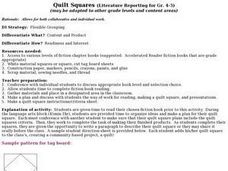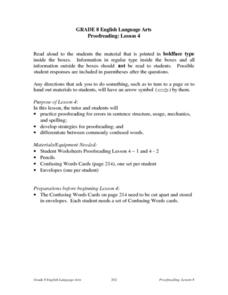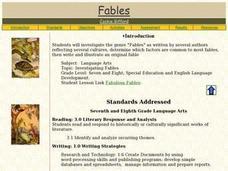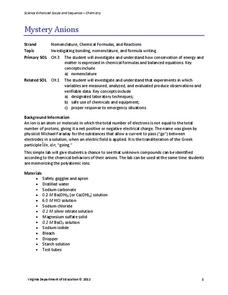EduGAINs
Solving Linear Equations
To find x, you have to get it by itself, correct? Individuals solve a linear word problem and share their solutions with others that solved the problem in a similar fashion. They then complete a self-assessment on how they feel about...
Curated OER
Sequencing The Mitten
Practice sequencing as a comprehension strategy. Have your class listen to The Mitten by Jan Brett and participate in guided practice with sequencing events. Then divide everyone into three groups based on understanding for...
Curated OER
Quilt Squares-Literature Reporting
Differentiate instruction with this crafty approach to demonstrating comprehension. Learners choose a fictional book at their reading level, and afterward create a quilt square. The square is "decorated" with words, illustrations, and...
Ontario
Computer Hardware —Computer Studies
What kind of components are needed for a computer? Through a differentiated lesson plan, individuals learn about six hardware computer components. They conduct research to determine the range of options for the components. Class...
Virginia Department of Education
Determining Direct Variation
Once learners realize what direct variation is, they see it's just a type of linear function. The lesson poses a general question that leads to the creation of the y = kx formula. The resource includes discussion prompts and ideas for...
E Reading Worksheets
Comprehension and Inference Question Creator
Encourage learners to ask questions about what they read with a instructional activity about comprehension and inference questions. The resource provides directions and examples that guide kids through crafting their own...
Curated OER
Proofreading: Lesson 4
Examine the key strategies to proofreading a piece of writing for errors in sentence structure, usage, mechanics and spelling. Eighth graders practice putting into correct passage commonly confused words (too, two, to) when writing to a...
Curated OER
Nouns in a Story
Students, assessing a variety of formatting tools with Microsoft Word, utilize a bank of vocabulary words to make a personal dictionary of nouns. They classify nouns for people, places, things and ideas and separate them into common and...
New York State Education Department
TASC Transition Curriculum: Workshop 5
Are video games sports? Pupils investigate this question as well as various nonfiction selections to learn more about claims and the support that defines them. All of the selections mimic the rigor on state tests and encourage close...
EngageNY
TASC Transition Curriculum: Workshop 12
How can opinions slant facts? Workshop participants learn how to examine primary and secondary sources and identify the author's point of view. They also examine how visual art impacts the meaning and rhetoric of sources. Full of...
Curated OER
Investigating Fables
Time for a story! Learners of all ages enjoy listening to stories, so read them some common fables and have them work cooperatively to create a fable. Differentiate for varying ability levels by providing sentence frames, graphic...
Curated OER
Exponential Functions
Analyze functions by their shape and equation and identify decay and growth based on the equation given. Learners graph their exponential functions and differentiate it using the logarithmic versus the exponential function.
Curated OER
Tomato Exploration
Create tomatoes in 15-20 minutes using this fun and interactive lesson plan! Learners listen to a book about tomatoes (recommendations listed), and focus on the vocabulary word tomato. They count the syllables...
For the Teachers
Sequence Plot Chart
Your kids can identify the plot sequence of a short story, but what about an informational article? Have them examine the chronological order of events in informational texts with a lesson on the sequence of events.
New York City Department of Education
Geography and Early Peoples of the Western Hemisphere
Young historians discover the early people of the western hemisphere. The unit explores how the land changed, how it was used and homes of early Americans such as Incas, Mayans, Inuits, Aztecs, and Pueblos. Individuals also examine these...
Virginia Department of Education
Acid-Base Theory
Litmus paper, why so blue? A chemistry lesson includes a pre-lab activity, practice calculating pH, an experiment measuring the pH in acids and bases, a titration demonstration, and a titration experiment.
University of California
Hot! Hot! Hot!
Calories are not tiny creatures that sew your clothes tighter every night, but what are they? A science lesson, presented at multiple levels, has learners experiment with heat, heat transfer, and graph the function over time....
Virginia Department of Education
The Hydrologic Cycle
There is the same amount of water on earth now as there was when it was formed. The water from your faucet could contain molecules that dinosaurs drank! Young scientists build their own hydrologic cycle model and observe...
Virginia Department of Education
Mystery Anions
Lost an electron? You should keep an ion them. Young chemists learn qualitative analysis in the second lesson of an 11-part chemistry series. After observing reactions of simple salts, the teacher provides pupils with unknown...
Virginia Department of Education
Predicting Products and Writing Equations
A chemistry lesson plan presents 14 chemical reactions for scholars to observe, write the equation, and balance the equations. Additionally, it provides ways to extend the activity as it relates to catalysts.
Virginia Department of Education
Equilibrium and Le Chatelier’s Principle
The best part of learning about equilibrium is that nothing changes. Young chemists observe four demonstrations during this lesson plan: equilibrium in a saturated solution, equilibrium with an acid-base indicator, equilibrium with...
EngageNY
Finding Systems of Inequalities That Describe Triangular and Rectangular Regions
How do you build a polygon from an inequality? An engaging lesson challenges pupils to do just that. Building from the previous lesson in this series, learners write systems of inequalities to model rectangles, triangles, and even...
Virginia Department of Education
Solving and Graphing Inequalities
You can't go wrong with a instructional activity that involves candy! Learners solve and graph one-variable inequalities and use candy to graph the solution. Individuals associate open circle graphs with life savers and closed circle...
Virginia Department of Education
Distance and Midpoint Formulas
Small groups work through two guided activities to derive the distance and midpoint formulas for the coordinate plane. The activities begin with concrete examples and move to abstract.

























